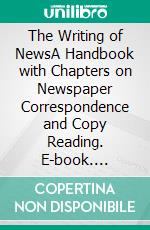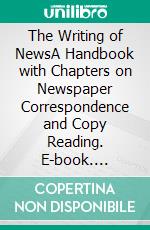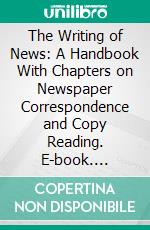The Writing of NewsA Handbook with Chapters on Newspaper Correspondence and Copy Reading. E-book. Formato PDF - 9788834166420
di Charles G. Ross
edito da IONLINESHOPPING.COM , 2019
Formato: PDF - Protezione: nessuna
In preparing this volume the author has had in mind the needs not only of students in schools of journalism, but of others who may desire a concise statement of the principles that govern the art of news writing as practiced by the American newspaper. It is hoped the book will prove helpful either as a laboratory guide in the school room or as a text book for home use.
As the title indicates, the book deals with one phase of journalism, the presentation of the news story, more especially with the writing of the story—the reporter’s part in the day’s work. No attempt has been made to go into other aspects of journalism—the writing of editorials, the administrative features of the work, the delicate adjustment that every newspaper must make between its business and news departments—except in so far as they bear directly upon the subject in hand.
The term journalism is broadly used here to mean all branches of newspaper endeavor. In common with other newspaper men, the author admits an aversion to the word as restricted to the working field of the men who get and write the news. They call themselves not journalists, but reporters or newspaper men. It is for newspaper men and women in the making that the book is primarily designed.
The nature of newspaper work makes it impossible to formulate an all-sufficing series of rules by which the news writer shall invariably be guided. But there are certain well-defined principles, largely technical, that set apart the news story as a distinct form of composition, and these the author has tried to put down simply and concisely—after the fashion of the news story itself. Going beyond the common practice, there is wide divergence among newspapers in the details of “office style.” Methods peculiar to the individual paper can readily be acquired by one grounded in the essentials of the craft; hence only the more significant points of departure from the generally accepted practice have been noted.
Practically all the examples in the book are from published news stories, reproduced in most cases exactly as they appeared in print. In some, for obvious reasons, fictitious names and addresses have been substituted for the real. With one or two exceptions the examples illustrating right methods of news presentation have been chosen not for special brilliancy, but as fairly showing the everyday output of the trained news writer.
As the title indicates, the book deals with one phase of journalism, the presentation of the news story, more especially with the writing of the story—the reporter’s part in the day’s work. No attempt has been made to go into other aspects of journalism—the writing of editorials, the administrative features of the work, the delicate adjustment that every newspaper must make between its business and news departments—except in so far as they bear directly upon the subject in hand.
The term journalism is broadly used here to mean all branches of newspaper endeavor. In common with other newspaper men, the author admits an aversion to the word as restricted to the working field of the men who get and write the news. They call themselves not journalists, but reporters or newspaper men. It is for newspaper men and women in the making that the book is primarily designed.
The nature of newspaper work makes it impossible to formulate an all-sufficing series of rules by which the news writer shall invariably be guided. But there are certain well-defined principles, largely technical, that set apart the news story as a distinct form of composition, and these the author has tried to put down simply and concisely—after the fashion of the news story itself. Going beyond the common practice, there is wide divergence among newspapers in the details of “office style.” Methods peculiar to the individual paper can readily be acquired by one grounded in the essentials of the craft; hence only the more significant points of departure from the generally accepted practice have been noted.
Practically all the examples in the book are from published news stories, reproduced in most cases exactly as they appeared in print. In some, for obvious reasons, fictitious names and addresses have been substituted for the real. With one or two exceptions the examples illustrating right methods of news presentation have been chosen not for special brilliancy, but as fairly showing the everyday output of the trained news writer.
Ean
9788834166420
Titolo
The Writing of NewsA Handbook with Chapters on Newspaper Correspondence and Copy Reading. E-book. Formato PDF
Autore
Editore
Data Pubblicazione
2019
Formato
PDF
Protezione
nessuna
Punti Accumulabili



